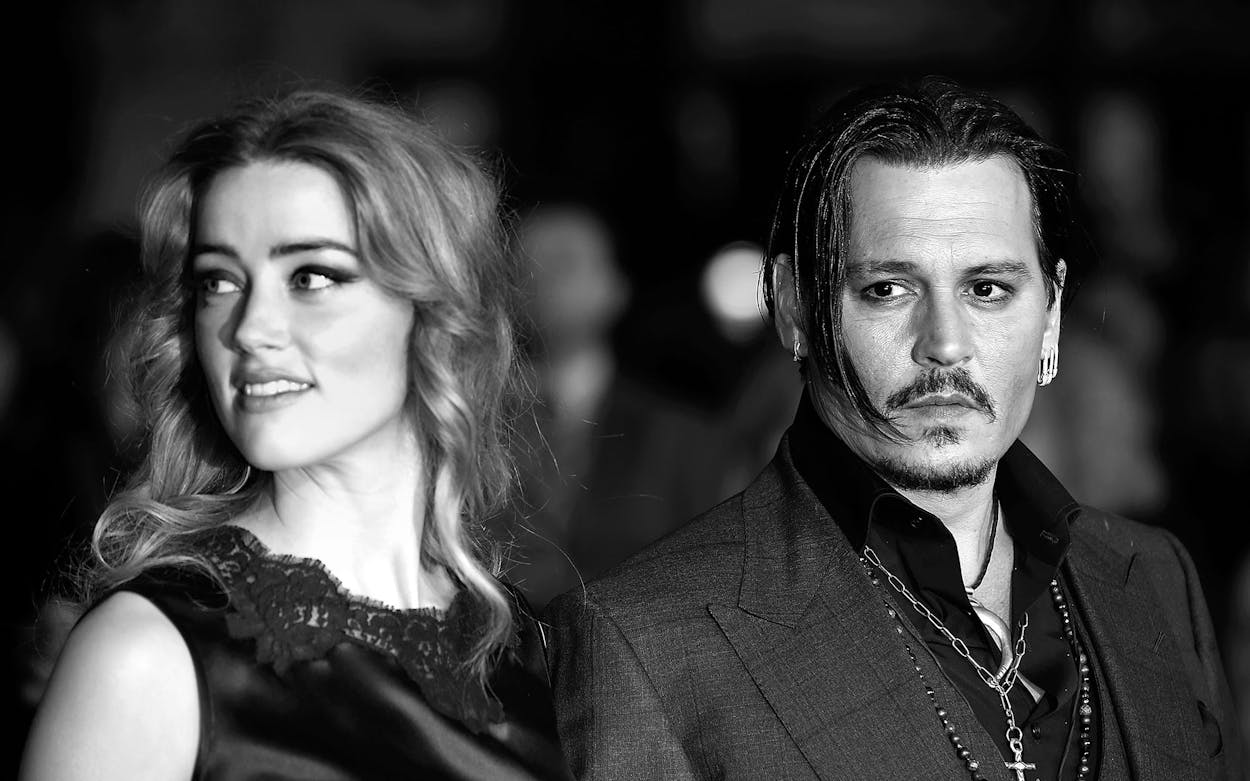In May 2016, Austin native Amber Heard filed for divorce from Johnny Depp after a year of marriage. The split wasn’t an easy one—in addition to filing for divorce, the Justice League star also filed for a restraining order against her husband.
In court documents, Heard alleged that Depp had been abusive toward her during the course of their four-year relationship. She left the Los Angeles courthouse where she filed for divorce with a bruise under her right eye. In the paperwork for the restraining order, the actress described an incident of domestic violence that took place the night before. It wasn’t, according to her filing, the first time something like that had happened.
Depp’s lawyers denied the charges, and the public reaction to Heard’s allegations was muted. Despite the accusations, the photographs of Heard with a black eye, and text messages obtained by ET in 2016 in which Heard privately expressed her fears years earlier, Depp suffered few professional consequences.
But that was 2016. In 2017, famous men who are implicated as predatory toward women have faced swift consequences. Over the past two months, the list of men accused of inappropriate behavior towards women has grown staggeringly long: Harvey Weinstein, Russell Simmons, Louis C.K., Brett Ratner, James Toback, Jeffrey Tambor, Al Franken, John Lasseter, Matt Lauer, Garrison Keillor, and on. (Others, such as Kevin Spacey and George Takei have faced allegations that they sexually assaulted men.) Some sort of action has been taken against all of the men listed—they lost the companies they helped build, their TV deals, or now face a Senate ethics investigation.
In most of the stories that have been told as part of the #MeToo movement, the men face allegations of sexual assault, sexual harassment, or both. Heard accused her ex-husband of domestic violence, not sexual assault. But regardless of the specific nature of the claims, a question lingers: Would Johnny Depp have faced so few consequences if Heard had made her accusations a year later, in the midst of a national campaign rooted in the idea that women should be believed when they report being victimized by powerful men?
This question came to a head this week after David Yates, the director of Harry Potter spin-off Fantastic Beasts: The Crimes of Grindelwald, defended the decision to cast Depp as the film’s villain to Entertainment Weekly:
“Honestly, there’s an issue at the moment where there’s a lot of people being accused of things, they’re being accused by multiple victims, and it’s compelling and frightening,” Yates said. “With Johnny, it seems to me there was one person who took a pop at him and claimed something. I can only tell you about the man I see every day: He’s full of decency and kindness, and that’s all I see. Whatever accusation was out there doesn’t tally with the kind of human being I’ve been working with.” . . .
“By testament, some of the women in [Depp’s] life have said the same thing — ‘that’s not the human being we know,’” Yates said. “It’s very different [than cases] where there are multiple accusers over many years that need to be examined and we need to reflect on our industry that allows that to roll on year in and year out. Johnny isn’t in that category in any shape or form. So to me, it doesn’t bear any more analysis. It’s a dead issue.”
Yates’s ultimate conclusion that it’s a “dead issue” is striking. He distinguishes between cases with a single accuser, like Heard, and those with multiple victims. But after a complaint from one subordinate, NBC fired Matt Lauer. After one allegation of inappropriate behavior, Minnesota Public Radio fired Garrison Keillor. After accusations from one woman, Al Franken faced investigation from the Senate Ethics Committee.
Men accused of violence toward women often have some female friends and coworkers who will attest that they never saw this behavior. Women stepped forward to explain that Harvey Weinstein hadn’t been inappropriate around them, and Al Franken’s former colleagues wrote an open letter explaining that they knew him as a good man. That Vanessa Paradis, Depp’s wife until 2012, has said he did not abuse her doesn’t tell us much about how he behaved toward Heard.
The tenor of the #MeToo movement casts a new light on defenses of Depp. When Heard filed for divorce, comedian Doug Stanhope penned an essay for The Wrap, insisting his friend was being blackmailed and claiming that he was there the night before she filed for divorce. It echoed Stanhope’s actions a year earlier, after the now-defunct Gawker ran a blind item about a comedian who masturbated in front of women he’d just met, prompting rampant speculation that the person in question was Louis C.K. At the time, Stanhope insisted that the person in question was actually him, not his more famous and successful friend. Earlier this month, C.K. admitted that he was the person in the Gawker story.
Stanhope’s essay, published swiftly after Heard’s allegations were made public, helped shape the narrative at the time. Support from friends like filmmaker Terry Gilliam and actor Paul Bettany, alongside the statements from other women who had been involved with Johnny Depp years earlier, cleared Depp’s reputation enough for him to land a role in a high-profile blockbuster. That character testimony hasn’t saved the careers of Weinstein or Franken in 2017.
We may never know exactly how Heard got that black eye, or hear the other side to the story she told in her divorce filing. But if she had come forward as “believe women” was becoming a guiding principle, we would likely talk about their story differently.








